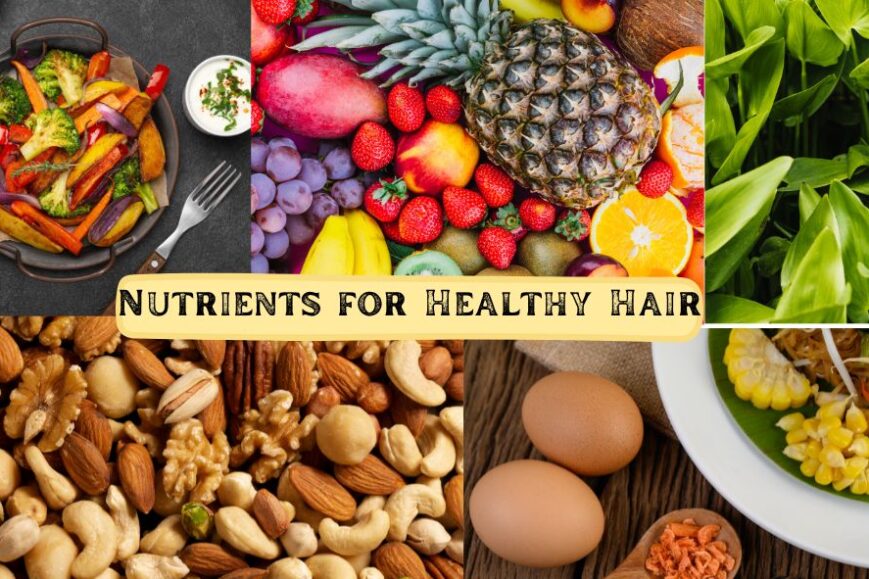I was thinking about Nutrients for Healthy Hair and reducing hair loss. Learn what your hair requires so that it is well taken care of.
Healthy, lustrous hair is not just a matter of aesthetics, it’s a reflection of your overall health. Nutrients are the building blocks of healthy hair, and understanding their role is crucial.
Whether it’s genetics or environmental factors, the right nutrients are essential for promoting hair growth, strength, and shine.
We offer Nutrients for Healthy Hair, recommend changes in your diet, and point out vitamins for a healthy scalp. By following our recommendations, you will quickly notice a positive change in the state of your hair.
To comprehend hair care

Hair is primarily composed of keratin, a protein found in the hair strands on the outermost layer of the skin. This protein develops in three distinct stages, each contributing to the strength and health of your hair. Understanding this process can help you make more informed decisions about your hair care routine.
Understanding the life cycle of hair:
Role of Nutrients during every phase
For hair to grow in all three phases of the hair development cycle, proper nourishment is essential. Nutrients for healthy hair are crucial in anagen, the stage of rapid cell division and growth. They are necessary for preserving health during Catagen, even when follicle growth is sluggish. In the Telogen stage, a nutritious diet helps follicles to adjust for further growth. Sufficient quantities of vitamins, minerals, and proteins are constantly required to maintain their viability and promote the growth of healthy hair.
Some of the common nutritional deficiencies that can have a significant impact on the health of your hair are as follows:
- Iron deficit can induce hair loss because it is essential for growth.
- Protein: Since hair forms of protein, impaired protein input may result in hair that is both frail and brittle.
- Vitamins: Vitamins A, B (the most important biotins), C, D, and E are essential for the development and strength of hair.
- Omega-3 Fatty Acids: A deficiency in this substance may result in dry scalp and lacklustre tresses.
Differences between Good and Bad Hair
| Good Hair | Bad Hair |
|---|---|
| When scalp oils ensure proper hydration, hair is glossy and sleek. | However, dullness lacks such shine and looks dead. |
| Hair that can withstand manual styling without getting destroyed can be considered elastic and strong. | Whereas breakable will describe brittle hair. |
| Strands having a lot of hair per square inch are usually full-bodied. | While it is common for any healthy person to shed between 50 and 100 strands during normal combing. |
Comprehending these symptoms can better support hair health. Integrating a wide variety of nutrients for healthy hair can help with these challenges and enhance good hair growth. However, one needs to be aware that good hair growth is supported by a diet that contains all the essential vitamins and minerals and enough proteins.
Crucial Nutrition for Healthy Hair

Proteins
Importance of Protein for Hair Structure: Hair is formed chiefly of an importance called keratin, which is a kind of protein. For a person’s hair to remain strong, flexible and whole, they must consume enough proteins. Insufficient protein intake will cause the strands to become quite flaky and break off more often.
Protein foods that are rich include:
- Lean meats (chicken, turkey)
- Fish (salmon, tuna)
- Eggs
- Dairy products (milk, yogurt, cheese)
- Legumes (beans, lentils)
- Nuts and seeds
Vitamins
Biotin (Vitamin B7)
What is its function in hair development?: Biotin, also known as vitamin b7, has an essential role in keratin, which in turn is required in hair making, thus improving its growth and robustness as well as aiding in the absorption of fats interfering with weight gain; similarly, it also aids in behind the scenes energy generation by accelerating the metabolism of high-calorie products.
Sources of Biotin:
- Eggs
- Nuts (almonds, walnuts)
- Seeds (sunflower seeds)
- Salmon
- Sweet potatoes
- Avocados
Vitamin C
Priority for Collagen Production and Antioxidant Protection: Vitamin C must be produced to make collagen, which strengthens hair and helps it grow. Having this property means it is also essential because it helps shield against those things created by free radicals.
Sources of Vitamin C:
- Citrus fruits (oranges, lemons)
- Berries (strawberries, blueberries)
- Kiwi
- Bell peppers
- Spinach
- Broccoli
Vitamin D
Role in Hair Follicle Health: Make hair strong and shiny and grow faster through Vitamin D. This also sustains existing hairs.
Sources of Vitamin D:
- Sun exposure
- Fatty fish (salmon, mackerel)
- Fortified foods (milk, orange juice)
- Egg yolks
- Mushrooms
Vitamin E
Benefits for Scalp Circulation: One of the roles of vitamin E is to help improve blood circulation in the head, leading to enough nutrients for healthy hair reaching hair follicles while protecting them by acting as an antioxidant.
Sources of Vitamin E:
- Nuts (almonds, sunflower seeds)
- Green leafy vegetables (spinach, kale)
- Vegetable oils (sunflower oil, olive oil)
- Avocados
- Fortified cereals
Minerals
Iron
Role in Preventing Hair Loss: Iron is required for the human body to produce haemoglobin, through which oxygen is transported to the hair follicles. It prevents hair loss and ensures its nutrition.
Sources of Iron:
- Red meat
- Poultry
- Fish
- Legumes (lentils, chickpeas)
- Spinach
- Fortified cereals
Zinc
Importance for Hair Tissue Growth and Repair: Zinc accounts for substantial growth and repair of hair tissues. Consequently, oil glands around hair follicles are kept functional, preventing hair loss and promoting growth.
Sources of Zinc:
- Meat (beef, pork)
- Shellfish (oysters, crab)
- Legumes (chickpeas, lentils)
- Seeds (pumpkin seeds, sesame seeds)
- Nuts (cashews, almonds)
Omega-3 Fatty Acids
Benefits for Scalp Health: Trimethylamine oxide compounds make your hair flabby and lean since they remove moisture from the hair. Unlike trimethylamine oxide compounds that make your hair flabby and lean since they remove moisture from one’s hair.
Sources of Omega-3 Fatty Acids:
- Fatty fish (salmon, mackerel, sardines)
- Flaxseeds
- Chia seeds
- Walnuts
- Algal oil (a plant-based source)
- Soybeans
Adding these essential Nutrients for Healthy Hair to your food helps immensely improve hair texture, robustness, and appearance. Healthy hair depends on regularity and a balanced diet.
Proper Nutrients for Healthy Hair
Balanced Diet
Hydration
Healthy Fats
Avoiding Harmful Substances
This daily routine adherence boosts both hair wellness and form. To keep your hair strong, vibrant, and healthy , you must feed adequately, take plenty of water, Nutrients for healthy hair use proper fats and avoid unhealthy substances.
Supplements or Natural Nutrition
Here’s a simple and informative table comparing supplements and natural nutrition and Nutrients for Healthy Hair
| Aspect | Supplements | Natural Nutrition |
|---|---|---|
| When to Consider | When specific nutrient deficiencies are diagnosed and cannot be met through diet alone. | As the primary source of nutrients for overall health, including hair. |
| Risks | Potential for toxicity, adverse interactions with medications, and nutrient imbalances. | Low risk when consuming a varied and balanced diet. |
| Choosing Supplements | Seek advice from healthcare professionals and opt for quality-certified products. | Focus on a diverse diet with a range of nutrient-rich foods. |
Prioritize a properly balanced diet and use supplements as a last option, with guidance from an expert.
Practical Tips and Tricks Nutrients for Healthy Hair
- Meal Planning Nutrients for Healthy Hair
- Recipes for Hair-Nourishing Meals
- Lifestyle Changes to Complement Nutritional Efforts
You can enhance and sustain the nutritional efforts you make by adding these helpful hints and strategies to your regular regimen Nutrients for Healthy Hair.
Specific Foods for Healthy Hair
Lean Proteins: Lean proteins are essential for hair growth and restoration. They provide the necessary structure blocks for keratin, the protein that pushes up hair.
Examples:
- Chicken: An excellent source of high-quality protein that supports hair design and power.
- Fish: Rich in protein and omega-3 fatty acids, which nurture hair and support scalp healthiness.
- Beans: Supply plant-based protein, iron, zinc, and biotin, paramount for hair health.
Fruits and Vegetables: Fruits and vegetables reserve vitamins, minerals, and antioxidants that protect and promote hair growth.
Examples:
- Berries: Strawberries, blueberries, and raspberries are rich in vitamin C, stimulating collagen production and protecting hair from extreme damage.
- Spinach: Loaded with iron, folate, Vitamin A, and Vitamin C, which help keep hair follicles healthy and promote hair growth.
- Sweet Potatoes: High in beta-carotene, which the body transforms to Vitamin A, encouraging healthy hair and scalp.
Nuts and Seeds: Nuts and seeds supply necessary fatty acids, vitamins, and minerals that nourish the scalp and help hair growth.
Examples:
- Almonds: High in biotin and Vitamin E, which protect hair from oxidative tension and support hair growth.
- Flaxseeds: Flaxseeds are an excellent start of omega-3 fatty acids that help keep the scalp healthy and moisturized.
- Walnuts: Provide omega-3 fatty acids, biotin, and Vitamin E, maintaining hair and enhancing elasticity.
Whole Grains: Whole grains are filled with fibre, vitamins, and minerals, which promote general fitness and supply the nutrients needed for strong, healthy hair.
Examples:
- Brown Rice: Includes B vitamins vital for healthy hair growth and scalp health.
- Oats: Supply iron, zinc, and omega-3 fatty acids required for keeping healthy hair.
- Quinoa: A complete protein that contains all nine important amino acids, stimulating hair power and growth.
You can provide your hair with the nutrients it needs to grow well, healthily, and colorfully by include these items in your diet. It should include as many nutrients as possible in addition to nutrients for healthy hair, since a balanced, healthful diet is crucial for the wellbeing of hair.
Lifestyle Tips for Healthy Hair

Regular Exercise
- Benefits of Exercise for Hair Health:
Stress Management
- Impact of Stress on Hair:
- Tips for Managing Stress:
Proper Hair Care Routine
- Importance of Gentle Hair Care Practices:
- Avoid Over-Washing: Washing hair too regularly can deplete its natural oils, causing dryness and breakage. Wash your hair 2-3 times every week, depending on its type.
- Use Mild Products: Choose mild sulfate-free shampoos and conditioners on the hair and scalp.
- Protect from Heat: Avoid using heated styling products such as hair dryers, flat irons, and curling irons. When using them, apply a heat-protectant spray.
- Gentle Brushing: To gently untangle hair, use a wide-tooth comb or a brush with soft hairs. To avoid breakage, begin at the end and work your way up.
- Avoid Tight Hairstyles: Types that pull on the hair, such as tight ponytails or plats, can cause hair deterioration and breakage. Opt for looser styles that reduce tension on the hair.
- Regular Trims: Cut your hair every 6-8 weeks to terminate split ends and stop further damage.
Conclusion
Robust hair maintenance goes beyond product use; it is an all-inclusive method involving proper diet, consistent activity, good stress relief methods, and tender hair management. The understanding of essential elements like proteins, vitamins, and minerals as well as healthy fats clarifies what you should eat in support of your hair’s growth and its tensile strength.
Consuming fruit, vegetables, nuts, seeds, and whole grains, along with foods high in protein, significantly improves the quality and vibrancy of the nutrients for healthy hair. In addition, following a modest hair care routine, engaging in appropriate exercise, and effectively managing stress can all help to maintain and improve healthy hair. Little advice, huge impact!
FAQs About Nutrition Tips for Healthy Hair
-
Which nutrients are important for healthy hair growth?
Hair needs proteins, vitamins (e.g., biotin, vitamin C, D and E), minerals – iron or zinc, and omega-3 fatty acids.
-
Which nutrient deficiencies might influence hair health?
Nutrient deficiency signs in hair health include hair thinning, lacklustre build, fragility, and slow hair growth. Consulting a medical practitioner for a proper diagnosis and medicine is essential.
-
Will it be enough to discuss taking care of our hair only using nutrition?
While diet is essential for hair health, other aspects must also be considered. Genetics, hormone balance, and lifestyle choices all influence the state of our hair. However, eating a well-balanced diet rich in essential nutrients is a natural step toward healthier and stronger hair.
-
What foods should you eat to make your hair healthier?
You can take some steps to improve your hair growth. Eating protein-rich foods, such protein foods as lean meats, fish, and beans; taking vitamin-rich foods like fruits and vegetables, including minerals-containing grains and nuts or seeds; and good fat sources, including avocados, when cooking are ways individuals can do so. A broad-range diet that includes nutrients is essential in improving the tingling sensation on your hair shafts.
-
Are hair growth supplements necessary for improving hair health?
Individuals with nutrient deficiencies or specific hair concerns can benefit from hair growth supplements. Before taking supplements, though, ensure a balanced diet and visit your healthcare provider.
-
When will dietary changes for hair health start achieving noticeable results?
The results of these changes may vary depending on individual characteristics such as genetic makeup, general physical condition, and hair disease severity. Following a nutrient-rich diet consistently is essential, as it will yield positive results, but it might take some time.

